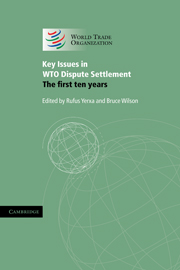Book contents
- Frontmatter
- Contents
- Notes on contributors
- Preface
- Table of cases
- Abbreviations
- PART I Introduction and General Considerations
- PART II The WTO Dispute Settlement System: Its Processes and Its Institutions
- 3 The WTO dispute settlement system and its operation: a brief overview of the first ten years
- 4 The role of the Dispute Settlement Body in the dispute settlement process
- 5 Consultations and the panel process in the WTO dispute settlement system
- 6 Contingent trade remedies and WTO Dispute Settlement: some particularities
- 7 The making of the ‘World Trade Court’: the origins and development of the Appellate Body of the World Trade Organization
- 8 Special challenges at the appellate stage: a case study
- 9 The reasonable period of time for compliance with rulings and recommendations adopted by the WTO Dispute Settlement Body
- 10 Implementation of panel and Appellate Body rulings: an overview
- 11 A brief introduction to countermeasures in the WTO dispute settlement system
- PART III The WTO Dispute Settlement System: Systemic and Other Issues
- PART IV Annexes
8 - Special challenges at the appellate stage: a case study
from PART II - The WTO Dispute Settlement System: Its Processes and Its Institutions
Published online by Cambridge University Press: 04 August 2010
- Frontmatter
- Contents
- Notes on contributors
- Preface
- Table of cases
- Abbreviations
- PART I Introduction and General Considerations
- PART II The WTO Dispute Settlement System: Its Processes and Its Institutions
- 3 The WTO dispute settlement system and its operation: a brief overview of the first ten years
- 4 The role of the Dispute Settlement Body in the dispute settlement process
- 5 Consultations and the panel process in the WTO dispute settlement system
- 6 Contingent trade remedies and WTO Dispute Settlement: some particularities
- 7 The making of the ‘World Trade Court’: the origins and development of the Appellate Body of the World Trade Organization
- 8 Special challenges at the appellate stage: a case study
- 9 The reasonable period of time for compliance with rulings and recommendations adopted by the WTO Dispute Settlement Body
- 10 Implementation of panel and Appellate Body rulings: an overview
- 11 A brief introduction to countermeasures in the WTO dispute settlement system
- PART III The WTO Dispute Settlement System: Systemic and Other Issues
- PART IV Annexes
Summary
The appellate phase of the US – Steel Safeguards case presented certain challenges from a practical perspective that were unusual in nature. This chapter examines those special challenges after first explaining the appellate process in general terms.
WTO appellate procedure
An appeal to the Appellate Body of the WTO may be filed by a disputing party any time within 60 days following the circulation of a panel report. An appeal is automatic: no leave is required. The Appellate Body is composed of seven persons appointed by the WTO Members, each of whom serves a four-year term, which is renewable once. The jurisdiction of the Appellate Body is limited to ‘issues of law covered in the panel report and legal interpretations developed by the panel’ Thus the Appellate Body is not authorized to make findings of fact.
The WTO appellate phase is a 90-day process involving a written phase and an oral phase. According to the Working Procedures for Appellate Review, appellants must submit an appellant's submission setting out their arguments within ten days after filing a Notice of Appeal, and appellees must submit their arguments in an appellee's submission within 15 days thereafter (or 25 days after the filing of the Notice of Appeal). WTO Members that were third parties during the panel phase may file third participants' submissions setting out their positions within 25 days from the filing of the Notice of Appeal.
- Type
- Chapter
- Information
- Key Issues in WTO Dispute SettlementThe First Ten Years, pp. 80 - 87Publisher: Cambridge University PressPrint publication year: 2005
- 2
- Cited by



